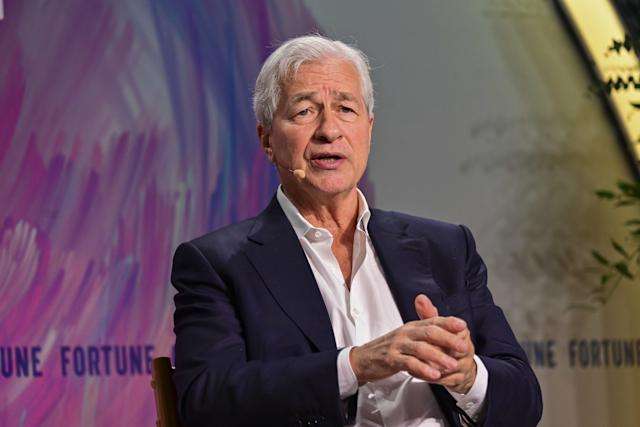By Lawson Kasshanna
Jamie Dimon has had a defining week. As JPMorgan Chase unveiled another round of blockbuster earnings, the veteran Wall Street chief once again emerged as one of the most influential voices shaping market sentiment.
Speaking in Washington, D.C., at the Fortune Most Powerful Women Summit alongside editor-in-chief Alyson Shontell, Dimon addressed what has become the defining economic conversation of 2025: the rise of artificial intelligence — and whether it’s fueling a financial bubble.
“AI Is Real — But Don’t Stick Your Head in the Sand”
Dimon rejected the idea that the AI surge is mere hype. “AI itself is real,” he declared, calling it a genuine technological revolution that will transform industries for decades. But he warned that its social and economic shocks are already underway.
“It will eliminate jobs,” Dimon said candidly, comparing AI’s disruption to the industrial impact of tractors and automobiles. “It happens too fast,” he added, urging governments, corporations, and communities to plan now for retraining, income support, or early-retirement programs. Otherwise, he cautioned, “you can’t just take all these people and throw them on the street … making $30,000 a year when they were making $150,000 — you’ll have a revolution.”
A Measured Warning on Market Euphoria
While Dimon believes in the enduring value of AI, he also sounded a sober note on financial markets. Some asset prices, he admitted, are “in some form of bubble territory.”
He compared the current AI boom to the early days of the internet — another period that saw wild speculation but ultimately produced lasting giants like Google, YouTube, and Meta. “You can’t look at AI as a bubble, though some of these things may be in the bubble. In total, it’ll probably pay off,” he explained.
Still, Dimon recently told the BBC that he sees a 30% chance of a market correction and considers himself “far more worried than others.”
Billions Invested — and Counting
Under Dimon’s leadership, JPMorgan has quietly built one of the most sophisticated AI infrastructures in global finance. Since 2012, the bank has invested billions in AI and machine learning, employing over 2,000 specialists and running hundreds of AI-powered applications.
From fraud detection and customer service to risk modeling and contract analysis, AI now underpins critical operations. Dimon estimates that these efforts have already generated over $2 billion in savings and new revenue streams.
Still, he draws an important distinction between classical AI — which has proven its worth — and generative AI, which remains untested and unreliable. Generative systems, he noted, often produce “hallucinations,” and despite their promise, 95% of early pilot projects have failed to show measurable returns.
Dimon dismissed the obsession with calculating immediate efficiency gains. “We spend a lot of money getting data into the proper format so it’ll be used by AI. We’re just doing it. We’re not measuring how much it costs,” he said, arguing that getting data right is the foundation for future value creation.
Training the Next Generation of Leaders
Dimon emphasized agility and humility as essential traits for executives navigating the AI age. “Use it. Get good at it. Make it part of your tool set, your weapon set, and you’ll learn. It’ll get better all the time,” he said.
JPMorgan now sends its managers to specialized AI “master classes” — a program designed to build hands-on understanding of the technology and its ethical, strategic, and operational implications.
A Pragmatic Call for Leadership
As AI fuels nearly 40% of U.S. GDP growth in 2025, Dimon’s message stands out for its realism. He urged policymakers to pair innovation with thoughtful regulation, safety nets, and deliberate planning.
For Dimon, the worst mistake would be complacency. “The AI era is here,” he said plainly. “The worst response is denial or delay.”















